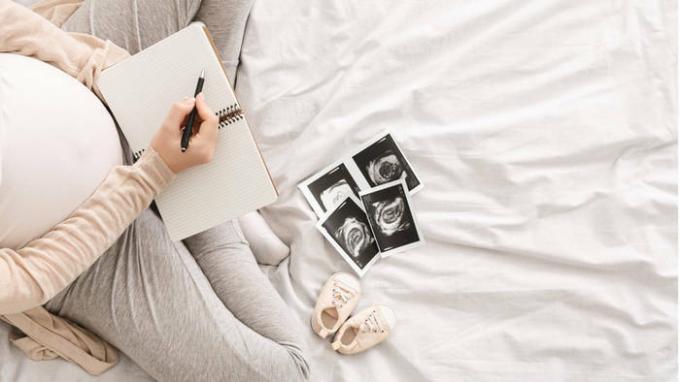Scheduled ultrasound during pregnancy: at what time is done and what the doctor looks at. How many times can an ultrasound be done during a normal pregnancy? Is frequent ultrasound dangerous for a child
Many pregnant women are ready to run for an ultrasound scan almost every week, they are so interested in how the baby develops in the womb. They often ask the gynecologist for an "additional" examination and are seriously offended by the doctor who says that this is not necessary. It is believed that ultrasound is safe for a baby, so why not look at it with one eye? In fact, there are clear indications for this type of research during pregnancy. An obstetrician-gynecologist, a doctor of ultrasound diagnostics of the Kiev city maternity hospital №1 told about them Vasily Gaziy.
How often can an ultrasound scan be done during pregnancy?

You shouldn't "meet" your baby on ultrasound too often / istockphoto.com
It is generally accepted that ultrasound examination of the fetus during pregnancy is safe for the unborn child. Especially when it comes to standard "two-dimensional" ultrasound. Pregnancy protocols say that it can be done as many times as the woman's doctor prescribes. However, doctors try not to overuse this type of diagnosis.
There is unverified evidence that too frequent ultrasound can provoke the development of various neoplasms in the fetus. These can be both external (on the body) and internal (on organs) tumors. The fact is that under the action of ultrasound, soft tissues are heated. And hyperthermia, in turn, leads to the appearance of deformations. It has been proven that an ultrasound scan raises the temperature of the affected area by 2-5 degrees for an hour. Of course, no one conducts examination of a pregnant woman for so long. But once again, you should not expose the baby to the procedure.
It has been clinically established that for a pregnant woman, three ultrasounds are enough throughout the entire period of bearing a child. Sometimes there is a need to prescribe an additional, fourth ultrasound (closer to childbirth). More examinations can be prescribed by a doctor - for example, in case of a complicated pregnancy. And obviously not in order to "double-check" the sex of the child.
First ultrasound: 4-5 weeks of pregnancy

First ultrasound helps "confirm" uterine pregnancy / istockphoto.com
“If you have a regular menstrual cycle and a delay of 10-14 days, you can take a pregnancy test at this stage,” says Vasily Gaziy. - If it is negative, most likely you just have a hormonal disorder of the menstrual cycle. If the test is positive, there is a good chance that you are pregnant. With such a delay, the estimated gestational age is 4-5 weeks. This period makes it possible during ultrasound to see pregnancy in the uterine cavity and to record the heartbeat of the embryo. "
Thus, the first ultrasound is considered a kind of "confirmation" of pregnancy and the determination of the viability of the embryo. In addition, during this examination, the doctor can establish more accurate terms of pregnancy, determine the location of the fetus (thereby excluding an ectopic pregnancy) and even identify multiple pregnancies (it is clearly visible already on 5 weeks). If the pregnancy is developing correctly, the next visit to the doctor will be in about 1.5-2 months.
Second ultrasound: 12-14 weeks of pregnancy

But with the second ultrasound, you will receive the first photos of the baby / istockphoto.com
“The second key moment for ultrasound will be first prenatal screening- Vasily Gaziy continues. - It is done at a gestational age of 11 weeks 4 days to 13 weeks 6 days. At this stage, the doctor must determine whether the anatomical formation of the fetus is proceeding correctly, and also exclude ultrasound signs of chromosomal abnormalities. "
You can do an ultrasound for the first screening on any day of the specified interval, but some doctors distinguish the so-called "happy days": these are 12 weeks and 2-4 days of pregnancy. It is believed that at this time the smallest organs of the fetus are better visible, so the assessment of their development will be more accurate. It is to this period that the standards by which chromosomal abnormalities are determined. For example, the thickness of the collar space (TPV), the coccygeal-parietal size (CTE), the length of the nasal bone. Failure to meet these standards may indicate pathology.
Third ultrasound: 18-21 weeks of pregnancy

On the third ultrasound, you can clearly see the baby's face / istockphoto.com
“If the pregnancy develops without complications, then the next visit to the doctor will be somewhere between 18 and 21 weeks of pregnancy,” says Vasily Gaziy. - This will be the second prenatal screening. The purpose of this screening is to exclude birth defects in the fetus. In particular, the doctor needs to exclude anomalies in the development of organs and vital systems. "
On the third ultrasound, the doctor pays close attention to the size of the fetus, as well as the location and size internal organs: by the time of 18-20 weeks, they are all already formed, and there are clear medical criteria for assessing them development. Also, on this study, you can more accurately determine the sex of the child (sometimes it does not coincide with what the doctor saw at 12-14 weeks). In addition, ultrasound checks the condition of the uterus, placenta and amniotic fluid.
“Many women believe that there is also a third prenatal screening (which is carried out at 32-34 weeks of gestation),” notes Vasily Gaziy. - In fact, this is an erroneous opinion. According to the pregnancy management protocols, there are only two prenatal screenings. Additional ultrasound in the third trimester is carried out if there is a medical indication or at the request of the woman. "
At the last ultrasound, the doctor assesses the baby's "readiness" for childbirth, its location in the uterus, size and physical activity. During this examination, problems such as oligohydramnios, placental abruption, cord entanglement, or breech presentation. Therefore, many doctors still prescribe it to a pregnant woman in order to exclude possible complications during childbirth.
You will also be interested to read:
Be careful: the most dangerous periods during pregnancy
The size of the baby by weeks of pregnancy: how to compare the baby




